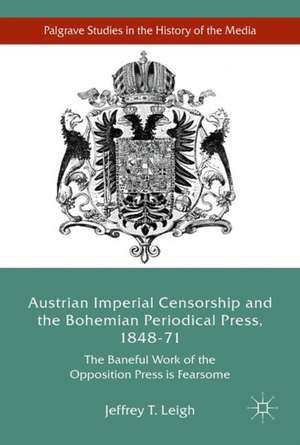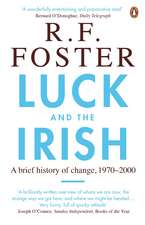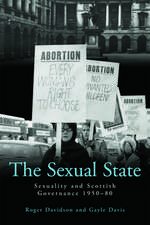Austrian Imperial Censorship and the Bohemian Periodical Press, 1848–71: The Baneful Work of the Opposition Press is Fearsome: Palgrave Studies in the History of the Media
Autor Jeffrey T. Leighen Limba Engleză Hardback – sep 2017
| Toate formatele și edițiile | Preț | Express |
|---|---|---|
| Paperback (1) | 529.42 lei 38-44 zile | |
| Springer International Publishing – 3 aug 2018 | 529.42 lei 38-44 zile | |
| Hardback (1) | 589.33 lei 6-8 săpt. | |
| Springer International Publishing – sep 2017 | 589.33 lei 6-8 săpt. |
Din seria Palgrave Studies in the History of the Media
- 18%
 Preț: 787.91 lei
Preț: 787.91 lei - 15%
 Preț: 696.35 lei
Preț: 696.35 lei - 15%
 Preț: 646.11 lei
Preț: 646.11 lei -
 Preț: 211.47 lei
Preț: 211.47 lei -
 Preț: 393.90 lei
Preț: 393.90 lei - 15%
 Preț: 585.26 lei
Preț: 585.26 lei - 15%
 Preț: 584.43 lei
Preț: 584.43 lei - 15%
 Preț: 700.61 lei
Preț: 700.61 lei - 18%
 Preț: 894.03 lei
Preț: 894.03 lei -
 Preț: 384.48 lei
Preț: 384.48 lei - 18%
 Preț: 738.06 lei
Preț: 738.06 lei -
 Preț: 385.84 lei
Preț: 385.84 lei -
 Preț: 391.61 lei
Preț: 391.61 lei -
 Preț: 449.90 lei
Preț: 449.90 lei -
 Preț: 389.70 lei
Preț: 389.70 lei -
 Preț: 385.47 lei
Preț: 385.47 lei - 15%
 Preț: 584.10 lei
Preț: 584.10 lei - 15%
 Preț: 587.72 lei
Preț: 587.72 lei - 18%
 Preț: 895.27 lei
Preț: 895.27 lei - 18%
 Preț: 732.84 lei
Preț: 732.84 lei -
 Preț: 391.61 lei
Preț: 391.61 lei -
 Preț: 391.79 lei
Preț: 391.79 lei - 15%
 Preț: 641.53 lei
Preț: 641.53 lei - 15%
 Preț: 531.59 lei
Preț: 531.59 lei - 15%
 Preț: 645.14 lei
Preț: 645.14 lei - 15%
 Preț: 585.08 lei
Preț: 585.08 lei - 15%
 Preț: 640.88 lei
Preț: 640.88 lei - 15%
 Preț: 586.38 lei
Preț: 586.38 lei -
 Preț: 388.72 lei
Preț: 388.72 lei -
 Preț: 381.59 lei
Preț: 381.59 lei -
 Preț: 386.22 lei
Preț: 386.22 lei -
 Preț: 392.21 lei
Preț: 392.21 lei -
 Preț: 395.47 lei
Preț: 395.47 lei -
 Preț: 387.20 lei
Preț: 387.20 lei - 15%
 Preț: 583.93 lei
Preț: 583.93 lei -
 Preț: 485.99 lei
Preț: 485.99 lei - 15%
 Preț: 582.80 lei
Preț: 582.80 lei -
 Preț: 392.60 lei
Preț: 392.60 lei -
 Preț: 391.61 lei
Preț: 391.61 lei - 15%
 Preț: 698.15 lei
Preț: 698.15 lei - 18%
 Preț: 791.57 lei
Preț: 791.57 lei
Preț: 589.33 lei
Preț vechi: 693.34 lei
-15% Nou
Puncte Express: 884
Preț estimativ în valută:
112.77€ • 118.04$ • 93.86£
112.77€ • 118.04$ • 93.86£
Carte tipărită la comandă
Livrare economică 31 martie-14 aprilie
Preluare comenzi: 021 569.72.76
Specificații
ISBN-13: 9783319558790
ISBN-10: 331955879X
Pagini: 330
Ilustrații: XV, 330 p.
Dimensiuni: 148 x 210 mm
Greutate: 0.57 kg
Ediția:1st ed. 2017
Editura: Springer International Publishing
Colecția Palgrave Macmillan
Seria Palgrave Studies in the History of the Media
Locul publicării:Cham, Switzerland
ISBN-10: 331955879X
Pagini: 330
Ilustrații: XV, 330 p.
Dimensiuni: 148 x 210 mm
Greutate: 0.57 kg
Ediția:1st ed. 2017
Editura: Springer International Publishing
Colecția Palgrave Macmillan
Seria Palgrave Studies in the History of the Media
Locul publicării:Cham, Switzerland
Cuprins
Chapter 1: Introduction.- Chapter 2: The Revolution Begins: All Was Seemingly at Risk.- Chapter 3: The Revolutionary Year: The Defeat of the Revolution and the Victory of the Rule of Law.- Chapter 4: Press Policy and the Early Neoabsolutist State: The Melding of Absolutism and Liberalism.- Chapter 5: Press Policy under Mature Neoabsolutism: Threat, Legality, and the Continual Appearance of Opposition Journalism.- Chapter 6: Censorship in the Era of Limited Self-Government: Negotiating their Way through ‘the Wreckages of Unsuccessful Experiments’ in an Expanding Public Sphere.- Chapter 7: Tábory: The Sum of their Fears.- Chapter 8: Conclusions.- Index.
Notă biografică
Jeffrey T. Leigh is Associate Professor of History at the University of Wisconsin-Marathon County, USA.
Textul de pe ultima copertă
This book analyzes the conduct of press policy in Bohemia from the Revolutions of 1848 through the period of the Tábory, 1867-71. In the aftermath of the revolutions, the Habsburg state, far from constituting an historical relic, proved itself boldly innovative, inaugurating liberal reforms, most importantly the rule of law. While the reforms helped it to survive its immediate challenges, they nonetheless, quite paradoxically, created an environment in which the periodical press continued to advance perspectives emblematic of the revolution, even during the era of Neoabsolutism. This new legal environment fostered the rise of the bourgeois public sphere, as theorized by Jürgen Habermas, and the very political movements that would contribute to its demise, as signaled in the Tábory campaign of 1867-71. At the nexus of civil society and the state stood the provincial Habsburg officials responsible for public order and security. Their experience was one of endeavoring to balance the ideals of the rule of law imposed by the Imperial center and their own vital concerns regarding the survival of the Monarchy. This work, for the first time, concentrates on the role of these officials who determined what would—and would not—appear in print.
Caracteristici
Examines the relationship of the Bohemian press to government censors from the 1848 revolutions to the 1871 Tabory Illustrates how the Habsburg Monarchy initiated reforms that contributed to its own demise Argues that Austrian Imperial censorship reform was instrumental in the growth of anti-Imperial political movements after 1848 Includes supplementary material: sn.pub/extras















